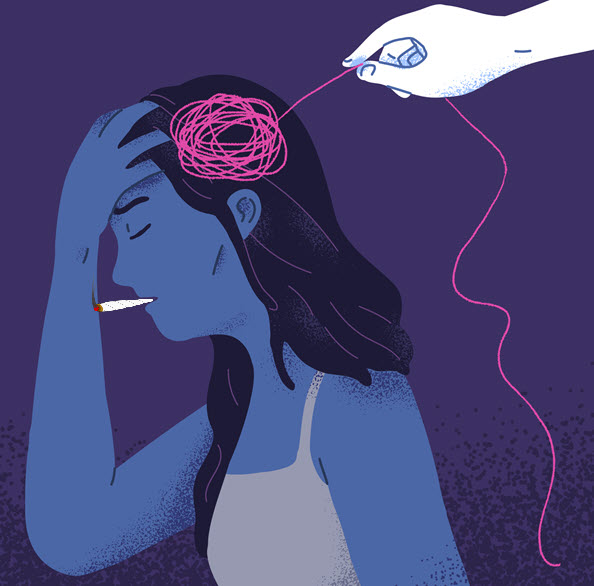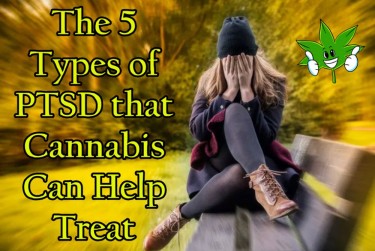
Why Does Cannabis Help People With PTSD So Much? Turns out THC is key, according to a new study
New study further proves that THC has a positive effect on PTSD
A recent study conducted by Wayne State University showed that low levels of THC, the primary psychoactive compound in cannabis, can help patients suffering from PTSD with emotional dysregulation. Research found that THC would help with emotional dysregulation, primarily when used in combination with cognitive reassessment therapy. This Wayne State University study was published in Neuropharmacology in August 2022.
Research suggests that people suffering from PTSD had fewer negative feelings when performing cognitive reassessment tasks when using low doses of THC compared to a placebo. The researchers also discovered that the patients given low THC doses exhibited increased brain activation in parts of the brain that were normally less activated in PTSD patients performing similar tasks. These THC-stimulated changes and effects were powerful enough to reduce the neurobiological discrepancies observed between those without and with PTSD. These changes are also believed to be responsible for the increased emotional control seen in patients on low THC doses.
Not the first of its kind
Wayne State University’s research into the effects of THC on PTSD is not the first study of its kind. Previous studies on the same topic have found that THC may be powerful enough to relieve symptoms of PTSD. These studies also suggest that THC may help reduce anxiety and stress from everyday life, lower chemical stress markers, and decrease treatment-related sensitivity in the amygdala. Nonetheless, this latest study is the first to assess the effects of THC on corticolimbic brain activation when PTSD sufferers perform cognitive reassessment tasks.
Cognitive reappraisal refers to events seen as emotionally triggering in a way that helps patients feel less intense about the situation. For example, if a person is scared and afraid that someone will be shot in a TV show, you will probably remember that it is inaccurate and that actors are just acting out a fictional story. Reevaluating the events in this light will help you contain and manage the sense of anxiety you got from watching the violent episode. Because some forms of therapy for PTSD patients employ cognitive reassessment, researchers felt the need to understand the impact of THC throughout the process.
A double-blind experiment was conducted to understand the effects of high-THC cannabis strains on corticolimbic brain activation when PTSD patients perform cognitive reassessment tasks. In the experiment, 51 people were randomly selected and received 7.5 mg of a placebo capsule or capsules of THC. Once the effects of the THC capsules started and were in the peak window, patients were asked to perform some specific emotional regulation tasks; particularly tasks involving cognitive reassessment. The features were applied to patients exposed to graphic and eliciting images who were then asked for a reassessment. During these tasks, patients are also simultaneously scanned with an fMRI machine and associated questions are asked about their emotional state.
Interestingly, previous studies on the effects of THC on PTSD sufferers have found that individuals with PTSD exhibit unique wave patterns of brain activation when performing cognitive reassessment tasks. If THC could significantly reduce the variations in brain activation patterns in PTSD sufferers, it could be a positive indication of why PTSD sufferers often report improved well-being from cannabis use.
result of the study
At the end of the experiment, researchers discovered that patients on low THC doses were able to effectively manage negative emotions when performing the reassessment tasks. In contrast, patients on placebo did not achieve much success. The researchers also discovered that other parts of the brain showed increased activation with THC, but such effects were not observed in patients receiving placebo. Brain parts with increased activation include the greater posterior and angular cingulate gyrus. These are parts of the brain that are bizarrely down-regulated in PTSD sufferers. In fact, the study was able to negate the differences in brain activation between PTSD sufferers and non-PTSD sufferers.
Because THC helps PTSD patients effectively reevaluate triggering memories and images, the psychoactive compound may not only reduce negative emotions in the triggering phase of therapy, but also help increase the effectiveness of therapy over the long term.
According to the researchers, previous studies have shown that PTSD patients showed reduced emotional arousal after re-exposure to the triggering images and memories. They achieved a successful rating against negative memories that they could not rate. Simply put, successful assessment has a long-lasting effect on emotional responsiveness every time a PTSD sufferer encounters a similar trigger in the future.
Researchers concluded that the psychoactive compound THC could be a useful pharmacological adjunct to cognitive reassessment therapy for the treatment of PTSD. By stimulating a successful and effective reappraisal, THC could offer lasting benefits to individuals with PTSD.
Limitations of the Study
While the research was positive, showing that THC could significantly reduce variations in brain activation patterns in PTSD sufferers, the researchers were careful to identify several limitations of the study. These limitations include the lack of blood tests to verify that participants were tested at the peak of THC’s potency. The researchers also noted that the study did not include trauma-specific imagery during the tasks. Although images that evoke fear usually have a different and more intense emotional reactivity in PTSD patients, non-traumatic images may have produced different results. Finally, the researchers pointed out that while the study used a double-blind placebo model, the sample size of 51 patients was relatively small. Hopefully, future research will be based on a larger sample size of patients for more reliable results and data.
Conclusion
Currently, PTSD sufferers are one of the most vocal proponents of cannabis’ medicinal benefits, with most claiming that THC helps relieve migraines, relieve stress and anxiety, and curb panic attacks. That said, more research needs to be done to support THC’s medicinal benefits, so there’s no need to jump to conclusions until there’s concrete evidence.
MORE ABOUT CANNABIS AND PTSD, READ MORE..

CANNABIS AND PTSD, HOW MANY TYPES ARE THERE OUT THERE?

Post a comment: